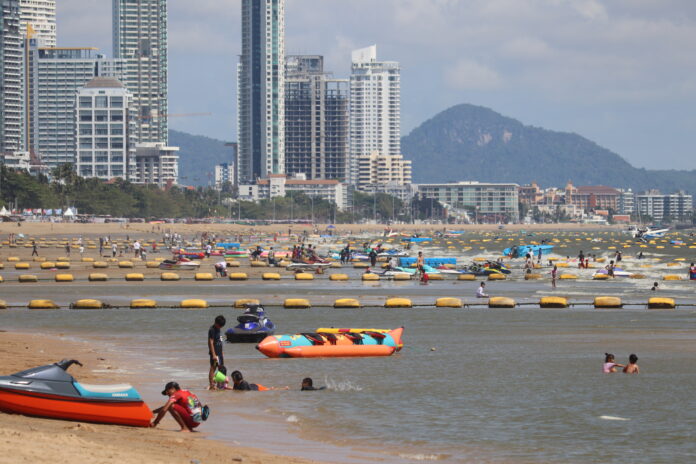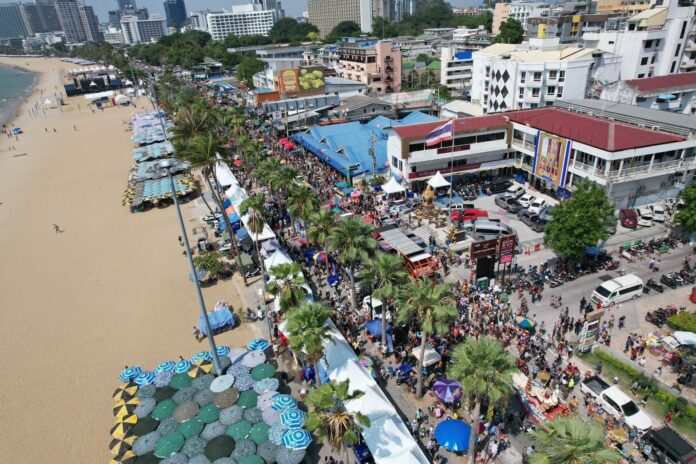Babies and young children are often at the greatest risk of heat-related mortality
BANGKOK, 8 May 2024 – Rain has finally brought relief to Thailand, but the country is still recovering from the record-breaking heatwave that gripped Southeast Asia throughout April and early May. Three dozen districts across Thailand's 77 provinces saw record temperatures in April, with 26 provinces suffering from heat soaring over 40 degrees Celsius.
Extreme temperatures pose critical challenges to children in Thailand and elsewhere, limiting outdoor activities, increasing their reliance on cooling methods and disrupting education. Simultaneously, changing weather conditions including unexpected storms can cause damage to homes and infrastructure and prevent many children from accessing basic services.
Heatwaves – which are made more likely by climate change – present a serious health threat to children, who struggle more than adults to regulate their body temperature. Greater exposure to heatwaves raises the risk of various health issues such as chronic respiratory conditions, asthma, and cardiovascular diseases. Babies and young children are at greatest risk of heat-related mortality.
UNICEF's recent reports underscore the gravity of the situation, revealing that millions of children worldwide are already grappling with the effects of rising temperatures, a number projected to soar in the coming decades.
According to UNICEF's 2022 report, "The Coldest Year of the Rest of Their Lives: Protecting Children from the Escalating Impacts of Heatwaves," 559 million children worldwide are currently grappling with frequent heatwaves, a figure projected to soar to 2.02 billion by 2050.
In Thailand, the situation is particularly alarming, with a significant majority of children experiencing the harsh realities of frequent heatwaves. Over 75 percent of children—approximately 10.3 million—were affected by high heat factors in 2020 alone, the report said. Without intervention, it's forecast that every Thai child under 18 will face more frequent and prolonged heatwaves by 2050.
Another climate-related report conducted by the Thailand Development Research Institute and UNICEF released last year pointed out that children in Thailand are at a high risk of climate change including high temperatures, flood and drought. Children living in Ubon Ratchathani, Nakhon Rachasima, Sri Saket, Nakhon Srithammarat and Narathiwat are at highest risk.
Experts in Thailand also pointed out that severe climate change will lead to declining agriculture yields with farmers and their families among the most vulnerable victims from climate crisis.
Despite these alarming statistics, the voices of these children have often gone unheard. Children are missing out on climate discussion and action. They are being recognized as vulnerable groups rather than active citizen or agents of change.
"Heatwaves have become significant challenges lately. With temperatures exceeding 40 degrees Celsius for several weeks, being in the sun has become nearly impossible. This situation is particularly challenging for young children, as they are unable to engage in outdoor activities," said Kwanjira Jaikla, 18, a member of the UNICEF Young People Advisory Board from Roi Et Province. "While I acknowledge the current efforts being made to tackle this issue, I hope to see more urgent actions in addressing climate change impacts on children. I also hope that adults include children and young people in climate actions, given their role in our daily lives."
Just 2.4 per cent of major global climate funds are allocated towards initiatives that address children's needs, according to a 2023 study — Falling short: addressing the climate finance gap for children conducted by members of the Children's Environmental Rights Initiative (CERI) coalition; Plan International, Save the Children, and UNICEF.
This neglect not only perpetuates their vulnerability but also silences their voices in critical climate discussions.
"As we confront the reality of a boiling world, it is imperative that governments, communities, and individuals alike work together to ensure the world we all live in is a livable one," said Kyungsun Kim, UNICEF Representative for Thailand. "By prioritizing investments in climate-resilient infrastructure and climate-smart basic services, promoting sustainable practices, and amplifying the voices of children in decision-making processes, we can create a future where they can thrive in safety and security."
The challenges posed by heatwaves are just one facet of the broader climate crisis facing our planet, said Kim. "As we navigate this uncertain terrain, let us not forget our responsibility to safeguard the well-being of future generations. We must work towards a sustainable future for every child, ensuring that they inherit a world that is resilient to the challenges of a changing climate." Kim said.
The preceding is a press release published with full permission and authorization by the organization(s) listed in the PR material and TPN media. The statements, thoughts, and opinions of the organization involved in the press release are entirely their own and may not necessarily represent those of TPN media and its staff.




























